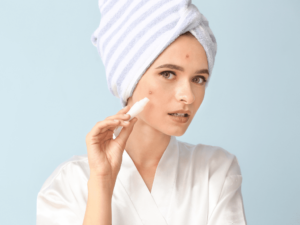Vitamin C, also known as ascorbic acid, is one of your best options when you want brighter, better-looking skin, that glows like never before. Vitamin C is a great antioxidant and it can help you reduce all kinds of skin inflammations and depigmentations. Also, it has so many other benefits for your body and skin so make sure you check out the video and article below to find out all about the use vitamin C and its benefits for your body and skin.
What is Vitamin C?
Vitamin C is a great antioxidant used to neutralize free radicals. You can find it in numerous foods, and it is highly recommended to integrate these into your diet if you want smooth, great-looking skin.
The most accessible vegetables and fruits like citrus fruits, strawberries, peppers, broccoli and potatoes contain this powerful antioxidant, so you can get the necessary amount of vitamin C only by eating the proper food. Because vitamin C can’t be stored in the body, if you are between 19 and 64 years old, you daily need to take 40 g of vitamin C to make sure your body and skin have all the antioxidants they need.
However, your diet is not the only measure that can help your vitamin C intake; it can be found in many serums, moisturizers, or body lotions that are incredibly beneficial for your skin.
What is Vitamin C good for?
Vitamin C has many benefits for your body and it is very important to consume fresh fruits and vegetables daily; your skin’s radiance and health depend on it! It maintains a great-looking aspect, keeps the blood vessels, bones and cartilages in formidable shape. It helps with wound healing, protects cells, and keeps them healthy.
Also, if you want to make sure your skin receives all the vitamin C it needs, you can use serums that are specially designed to provide that most needed ascorbic acid.

How Vitamin C helps your skin?
Any normal skin presents a high concentration of vitamin C that acts every day as a great barrier against destructive environmental factors. Also, it strengthens the skin, ensures the elasticity, boosts collagen and protects skin from UV rays.
Multiple studies show that on its own, topical Vitamin C can not penetrate the skin, but if the serums you use have the right ingredients and formulas, vitamin C is so beneficial. It is a great antioxidant and offers the best results when combined with vitamin E or hyaluronic acid.
Vitamin C slows down the ageing process, smoothens the skin and fine lines, and brightens your skin. The damaging ozone impact is diminished by vitamin C, making ascorbic acids ideal for all skin types, including sensitive ones, dehydrations and discolorations.
When and how to use Vitamin C on your face?
Usually, vitamin C should be applied on your skin once or twice per day. You need to follow a few steps to make sure you benefit from all the ingredients found in vitamin C:
- Properly cleanse and tone your skin;
- Apply serum;
- Lastly, do not forget to moisturize.
You might want to avoid products that contain niacinamide because, even if this common moisturizer component is ideals for several skin conditions, it will make the serum less effective.
Vitamin C is beneficial for your skin in so many ways. It can reduce hyperpigmentation, heal blemishes and create a stunning glow. Like any other treatment, consistency is the main key if you want to see the effectiveness. You can use it in the morning as a serum that also protects against UV or apply it before you go to sleep.
Which Vitamin C serum is best?
Vitamin C serums that are also combined with vitamin E are among the best. We recommend using a C E Ferulic containing 15% pure vitamin C, vitamin E (alpha-tocopherol), and ferulic acid. This mix gives your skin great protection against pollution and free radicals, but it also fights against atmospheric ageing. UVA and UVB rays can be damaging to your skin and so ozone pollution or diesel engine exhaust, but this serum boosts the protection up to 41%.
C E Ferulic makes skin feel and look firmer, brightened and strengthened, and creates a great protective barrier for your skin layers. This ascorbic acid is also paraben-free and once absorbed, it remains in your skin for 72 hours. It is easy to use, and you just need 4-5 drops of products that must be applied before any sunscreen or regular moisturizers.
Will Vitamin C help acne?
Vitamin C serum usage comes with so many benefits and can be helpful even for people who are dealing with acne. Because of its anti-inflammatory properties, vitamin C will help reduce unwanted redness and swelling. It is ideal for improving your acne wounds and giving your skin the proper nutrients to maintain elasticity and collagen production.
Consult a specialist and find out what concentration of vitamin C is good for you. For many women, a concentration that is too high can be too strong for their skin, causing unwanted itchiness or breakout that we’re sure you want to avoid. You want to find a cure for your problem, not to make it look even worse, so be careful when choosing the vitamin C dosage.
Vitamin C with Hyaluronic Acid
Combined with hyaluronic acid, vitamin C is an ideal product for your face. This mix can do real wonders for your skin because these two ingredients that are often paired can work individually.
While the acid maintains the skin moisture, repairs and regenerates skin tissue, boosts firmness and elasticity, vitamin C protects it from sun damage. It helps diminish skin discoloration, boosts collagen, and has an anti-inflammatory effect from which people struggling with sensitive skin, rosacea and acne can benefit.
Also, both of these ingredients will combat signs of ageing. Because topical vitamin C can sometimes cause irritations, dryness, or even acne, hyaluronic acid will build that creamy moisture and allow the skin to heal on its own.
You can choose products that contain both of these ingredients or individual products. In the second case, the hyaluronic acid must be applied after your vitamin C serum. The ascorbic acid penetrates your skin rapidly and can be followed by an SPF cream or your fav moisturizer.
When creating your skincare routine, make sure you use all the products properly. As we all know, oil floats, so you want to apply products based on water firstly. Oil-based products should come second because they keep the moisture in, giving your skin a protective layer. Also, you will need to let each product absorb (between 30 seconds to even 3 minutes) into your skin if you want complete effectiveness.

Conclusions
As you age, you need to take better and better care of your skin if you want to prevent signs of ageing. And vitamin C is a great way to treat fine lines, prevent skin discoloration and build a protective barrier. We all know that sun rays can affect your skin and cause unwanted problems and vitamin C serums and creams are certainly the best way to keep your skin protected.





